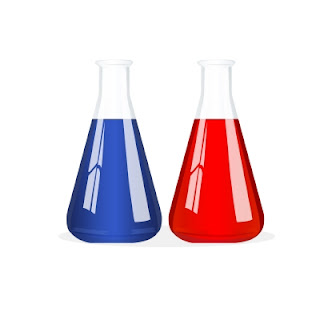Treatment of kidney disease: why acid levels in the blood matter?
Sometime ago, I had posted a brief overview of treatment of chronic kidney disease. However, one factor that does determine the progression of chronic kidney disease that I did not touch upon was the amount of "acid" in your blood, and its consequent effect on the kidneys.
 |
| Living systems are a delicate balance of acid and base: Nature's Ying & Yang
Image courtesy of Digitalart/ FreeDigitalPhotos.net
|
Many of my patients are genuinely surprised when I tell them that they have "acid" floating around in their blood. Some wonder why they never knew about it, or had the levels measured? Well, actually most people have. One of the most common blood tests that is ordered by your primary doctor as part of your routine physical is an "electrolyte panel", which measures the levels of common electrolytes in the blood like sodium, potassium, bicarbonate, creatinine, etc. Without getting too technical, I just want to state that acidity of any chemical comes from hydrogen in its ionic form. The more the hydrogen ions in a chemical, the more acidic it is. However, hydrogen ion level is typically not measured routinely in the blood. What is measured is the level of the electrolyte, bicarbonate. Bicarbonate level falls with increasing acid level of blood, and hence serves as an indirect gauge of the acid content. Bicarbonate level is often reported with a "negative" electric charge on blood test reports.
ACID??..HOW DID IT GET IN TO MY BLOOD?!
Acid is one of the waste products of metabolism. The protein that you eat is made up of building blocks called "amino acids". Some of these amino acids are rich in sulfur. These sulfur containing amino acids are eventually broken down/metabolized in to sulfuric acid, which forms the major source of acid in the blood. Yes, this is the same industrial grade sulfuric acid that you might have heard about! As you can imagine, having an endless production of sulfuric acid in the body is not exactly compatible with life. Hence, all living beings have developed evolutionary mechanisms to "neutralize" this acid. The mechanisms are called the body's buffer systems, and serve to "bind" to hydrogen ions. Bound neutralized hydrogen is no longer acidic. Therefore, anything that can gobble up hydrogen ions that are running amok in the blood stream will serve as a "buffer". The bicarbonate we talked about above is exactly that, a buffer. One of the sources of the body's bicarbonate are the kidneys. Bicarbonate binds to acidic hydrogen ions, and forms carbon dioxide and water. Your lungs breath out the carbon dioxide; your kidneys pee out the water (and also produce bicarbonate and ammonium that get rid of the body's acid).
WHAT HAPPENS WHEN YOU HAVE EXCESS ACID (OR LOW BICARBONATE) IN THE BLOOD?
The kidneys' function in getting rid of acid from your body cannot be overstated. Thus, when you develop kidney disease, bicarbonate production suffers, and the acid content of the blood increases. Your nephrologist or primary doc might tell you that "your bicarb level is low". Excess acid levels in the blood have implications for every organ, and lead to adverse effects like abnormal heart conduction, bone disease, blood pressure abnormalities, etc etc. In fact, abnormal bicarbonate level is now a known risk factor that increases your risk of death!
SO WHY IS THIS ORGANIC CHEMISTRY LECTURE IMPORTANT FOR KIDNEY DISEASE?
Recent studies have demonstrated that not only are low bicarbonate (or high acid levels) levels a risk for mortality, they also lead to accelerated progression of kidney disease. In other words, not only is excess blood acid a consequence of kidney disease, it actually directly makes your kidney disease even worse. So you are stuck in that vicious circle where one entity is leading to worsening of its own root cause. The reasons for this phenomenon are complex and include inflammation and increased blood pressure inside the kidneys' filtration system from abnormally high acid levels.
WHAT CAN I DO ABOUT HIGH ACID LEVEL IN THE BLOOD?
When, often frustrated, patients ask me in the clinic what can they do to slow down the progression of their kidney disease (in addition to the usual measures that I talked about earlier), I often recommend increasing the blood bicarbonate level by prescribing salts that contain bicarbonate (or its precursors that have citrate; a common brand name of such a drug is "Bicitra"). The typical target level of bicarbonate that needs to be achieved by such supplements is about 23 meq/L, which is something that your kidney doctor should manage. Baking soda is a typical non-prescription source of bicarbonate, but again, self-supplementation in patients with kidney disease without physician oversight is fraught with danger and should never be attempted.
Veeraish Chauhan, MD, FACP, FASN
Nephrologist
Sarasota/Bradenton



First let me start by thanking Veeraish for taking time out from his busy life and creating this blog, It is a wonderful blog. I happened to come across it a few days back , Its great cause we can share our views and ask for opinions from a real professional. Our family has a history of PKD.
ReplyDeleteI would like to know what you think of Micro-Chinese Medicine Osmotherapy, I see a lot of it featured on Google search. Also if you could your expert opinion on Tolvaptan tablets .
Thanks
Update for you: tolvaptan is now going to be tried yet again for PKD treatment after the last trial was not deemed good enough by the FDA. Will keep you posted!
Delete